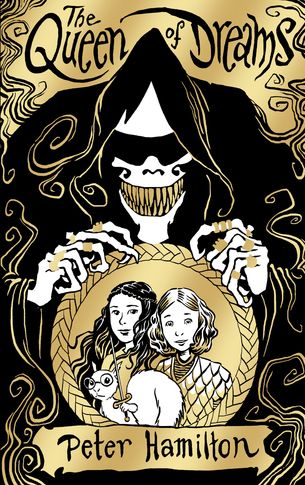The Queen Of Dreams by Peter Hamilton review .
Peter F Hamilton is the father of two children, Sophie and Felix, aged nine and seven at the time of writing. Statistically speaking, this means Peter F Hamilton is likely to be permanently on the edge of sleep deprivation, that he spends unfeasible amounts of time worrying about his anklebiters’ education, and that he’s constantly amazed by the sheer amount of time he spends shuttling his children to parties and activities.
But despite their wholesale and unreasonable disruption of his life, Peter F Hamilton loves his kids to bits - of course he does! Which is why his new novel finds him dropping the “F” and, rather than the space opera that’s made his name, crafting a fantasy-adventure tale aimed at children, a book that his kids can actually read.
This isn’t such a big leap as it might at first appear. After all, much of his Void sequence is set in what’s essentially a fantasy realm, while there’s something distinctly faerie-like about the Silfen, who appear in the Commonwealth books.
For The Queen of Dreams , Hamilton goes further, with a novel that’s rooted firmly in an English pastoral tradition of children’s literature. We find young sisters Taggie and Jemima heading off for a holiday on their father’s farm. Orchard Cottage, where the children will stay, is a place that’s yet to make it to the 21st century. “Only four rooms had electricity, and they were all on the ground floor,” writes Hamilton, “the iron kitchen range burned coal, and there certainly wasn’t any TV or broadband.”
Sounds idyllic. Except this won’t be a holiday like any other, as becomes clear from the moment a bespectacled white squirrel shows up. Shortly after this curious happening, things get curiouser still as the girls’ hitherto dull old pops is kidnapped and taken off into the First Realm, the land of Faerie. Heading down a metaphorical rabbit hole (actually a well), Taggie and Jemima go on a rescue mission to free their father from captivity at the hands of the dastardly King of Night.
What follows is never less than great fun, as the girls learn they are both princesses and, what’s more, both possessed of magical powers too. For the expansive Taggie, this means a similarly expansive ability to conjure up extravagant spells; while Jemima’s gift of divining the future is quieter but no less powerful in its way.
If these facets of the book draw heavily on the children’s literature of, say, Lewis Carroll or JM Barrie, at other times Hamilton takes delight in subverting his (older) readers’ expectations. Without giving too much away, there’s something distinctly vampiric about the light-fearing bad guys here, for example, while the appearance of stoner surfer-dude Elves is certainly a novelty.
Mostly, this works fine, as the sheer vim of Hamilton’s writing carries the story forward. However, the appearance of one Elizabeth Windsor at a crucial moment is arguably a playful contrivance too far. There’s also an episodic quality to the book that occasionally grates, as you’re whisked from one setpiece to the next.
Then again, there’s a lot to get through here. The Realms series will extend to a trilogy at least, and there’s a sense of Hamilton setting out his stall, getting Taggie and Jemima plus other key characters into place for future adventures, and even perhaps finding his meter for children’s fiction as he writes.
More importantly, at least from the perspective of an adult reader, this is a novel that, despite those worries over that episodic structure, makes you want to read just one more chapter before putting it down – and that in itself is a magical quality.
Jonathan Wright twitter.com/Jonathanw101
Read more of our book reviews .

